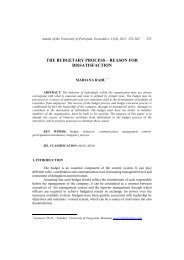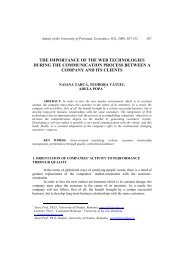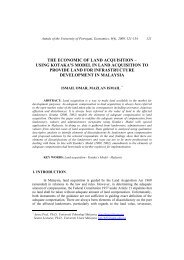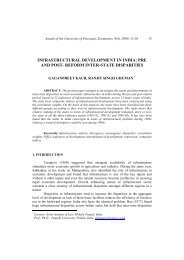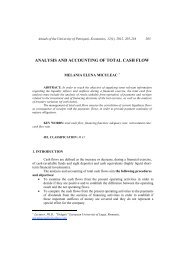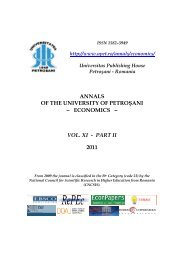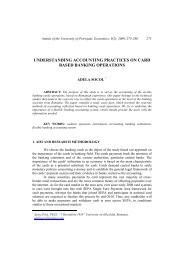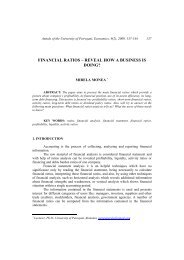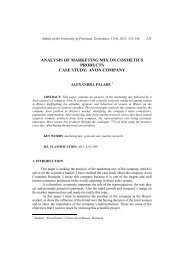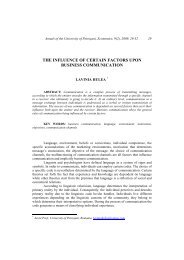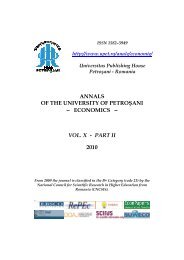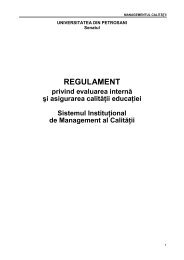annals of the university of petroÅani â¼ economics â¼ vol. xi - part i ...
annals of the university of petroÅani â¼ economics â¼ vol. xi - part i ...
annals of the university of petroÅani â¼ economics â¼ vol. xi - part i ...
You also want an ePaper? Increase the reach of your titles
YUMPU automatically turns print PDFs into web optimized ePapers that Google loves.
Regional Development - Past, Present and Future in Romania 31<br />
change and qualitative and administrative constraints, financial and cultural manifested<br />
in <strong>the</strong> construction <strong>of</strong> <strong>the</strong> complex system required for <strong>the</strong> formulation and<br />
implementation <strong>of</strong> regional policy, which is <strong>of</strong>ten characterized by a low degree <strong>of</strong><br />
fle<strong>xi</strong>bility.<br />
However, measuring <strong>the</strong> consequences <strong>of</strong> all <strong>the</strong>se units is more difficult,<br />
especially if attempts are beyond <strong>the</strong> raw results <strong>of</strong> an evaluation <strong>of</strong> growth rate and <strong>the</strong><br />
e<strong>vol</strong>ution <strong>of</strong> territorial imbalances. In recent decades <strong>the</strong>re has been a reduction <strong>of</strong> <strong>the</strong><br />
imbalances and inequalities between wealthier areas and less developed EU. This<br />
process has been generated in <strong>part</strong> by e<strong>xi</strong>sting long-term trends in advanced market<br />
economies, <strong>the</strong> regional efforts for equalization <strong>of</strong> national policies, o<strong>the</strong>r EU policies<br />
and rules established in favour encourage trade and mobility, as well as community<br />
interventions by regional politics.<br />
The magnitude scale <strong>of</strong> <strong>the</strong> last element cannot be appreciated because, as<br />
noted pr<strong>of</strong>essor Andre Sapir, "... in practice, <strong>the</strong> e<strong>vol</strong>ution <strong>of</strong> regional GDP data are not<br />
sufficient to distinguish <strong>the</strong> effects <strong>of</strong> this policy, <strong>the</strong> absence <strong>of</strong> o<strong>the</strong>r categories <strong>of</strong><br />
regional indicators, such as initial income, human capital, quality <strong>of</strong> local<br />
administration and in <strong>the</strong> absence <strong>of</strong> o<strong>the</strong>r influences separation.<br />
Regional Development Strategy will be developed in Romania in <strong>the</strong> fall<br />
guidelines and trends. Its successful application in future years will depend not only on<br />
ensuring necessary financial support but also how <strong>the</strong>y can meet <strong>the</strong> so-called<br />
"challenges Behavioural: <strong>part</strong>icipation, communication, mentalities and attitudes. An<br />
approach to strategy focused on <strong>the</strong> needs <strong>of</strong> citizens (people-centred approach) may<br />
lead to broadening <strong>the</strong> knowledge base, understanding and commitment <strong>of</strong> groups<br />
in<strong>vol</strong>ved in regional development, improving links promising local initiatives. In <strong>the</strong><br />
implementation phase strategy can be identified actors in<strong>vol</strong>ved: central and local<br />
government, business, non-governmental organizations and Last but not <strong>the</strong> latter,<br />
local communities, citizens. To think that <strong>part</strong>icipation is all non-governmental<br />
problems would be a big mistake: <strong>the</strong> government, central government and are local<br />
ones that should contribute to creating <strong>the</strong> conditions necessary for <strong>part</strong>icipation.<br />
In a democratic political system, local government is a key element. Its<br />
institutions provide a range <strong>of</strong> services essential to economic and social welfare <strong>of</strong><br />
residents, use a significant proportion <strong>of</strong> public money and are, directly and indirectly,<br />
a source <strong>of</strong> jobs. But local government is more than one service provider. It is <strong>the</strong> most<br />
closer to citizens and has an important role in representing <strong>the</strong> concerns and views<br />
outlined in local level. Local government must build <strong>the</strong> structures, environment able<br />
to support active <strong>part</strong>icipation. The only pertinent conclusion is that you cannot<br />
establish any relative performance <strong>of</strong> <strong>the</strong>se regions in <strong>the</strong> absence <strong>of</strong> regional policy. In<br />
conclusion, <strong>the</strong> results <strong>of</strong> its regional policy are somewhat modest in terms <strong>of</strong><br />
contribution to <strong>the</strong> overall objective <strong>of</strong> cohesion and <strong>the</strong> annual financial reporting<br />
transfers <strong>of</strong> around 40 billion Euros for <strong>the</strong> period 2000-2006.<br />
However, <strong>the</strong>re are some positive elements and effects generated by<br />
implementing this policy cannot be neglected. First, <strong>the</strong>re is a symbolic dimension <strong>of</strong><br />
regional policy as an expression <strong>of</strong> solidarity. The spatial management <strong>of</strong> <strong>the</strong> country’s<br />
territory constitutes a compulsory, permanent and <strong>of</strong> perspective activity, carried on in<br />
<strong>the</strong> interest <strong>of</strong> <strong>the</strong> collectivities that use it, in keeping with <strong>the</strong> values and aspirations <strong>of</strong>



